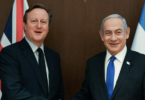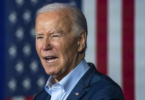BEIJING (AP): China’s Defense Ministry accused the US of “interference and surveillance” of a naval exercise in the South China Sea ahead of an incident in which a Chinese fighter pilot flew at high speed in front of a US Air Force reconnaissance plane, underscoring the rupture in contacts between their militaries.
A statement issued late Wednesday by the Chinese military’s Southern Theater Command said it had “organised air forces to track and monitor the whole process, dealt with it according to laws and regulations, and operated professionally.”
The US Indo-Pacific Command said the pilot of a Chinese J-16 fighter had “performed an unnecessarily aggressive maneuver” while intercepting a US Air Force RC-135 aircraft on May 26, flying directly in front of the plane’s nose.
“The RC-135 was conducting safe and routine operations over the South China Sea in international airspace, in accordance with international law,” the US side said. “We expect all countries in the Indo-Pacific region to use international airspace safely and in accordance with international law.”
Southern Theater Command spokesperson Senior Col. Zhang Nandong was quoted in the statement accusing the US of “mixing up black and white and making false accusations in an attempt to confuse the international audience.”
“We solemnly urge the US to conscientiously restrain the actions of front-line naval and air forces, strictly abide by relevant international laws and relevant agreements, and prevent accidents at sea and in the air,” Zhang said.
“If not, the US will bear all consequences,” he said.
Zhang did not say what international laws he was referring to. China’s claim to virtually the entire South China Sea is not recognised by the US and strongly contested by other countries bordering on the strategic waterway, through which an estimated $5 trillion of international trade passes each year.
The nature of the Chinese exercise wasn’t clear, nor was it apparent that Beijing had informed other countries of its activities.
While Beijing and Washington have signed agreements to handle “unexpected events” between their air and naval forces, China has broken off communication between the two militaries, largely in retaliation for US support for Taiwan. China claims the self-governing island as its own territory, to be annexed by force if necessary.
China also reacted angrily to the US shooting down earlier this year of a suspected Chinese spy balloon that had traversed the US, while Chinese Defense Minister Li Shangfu is under a US travel ban and other sanctions for overseeing arms transfers from Russia.
China has ruled out a meeting between Li and US Defense Secretary Lloyd Austin when the two men attend a security conference in Singapore over the weekend.
US Secretary of State Antony Blinken said on Wednesday that the plane incident showed the importance of the US and China maintaining dialogue at a senior level. He said it was “regrettable” that Beijing had rejected Austin’s request for a meeting with the Chinese defense minister.
“I think it only underscores why it is so important that we have regular, open lines of communication, including, by the way, between our defense ministers,” Blinken said at a news conference at the end of an EU-US trade and technology meeting in Lulea, Sweden.
China frequently challenges military aircraft from the US and its allies in the South and East China Seas, and the Taiwan Strait.
Similar actions led to a 2001 in-air collision over the South China Sea between a Chinese fighter and US Navy surveillance plane in which the Chinese plane was lost and pilot killed. The damaged US plane landed at a Chinese navy air force base, leading to the detention of the crew and a diplomatic standoff between the sides.
In Tuesday’s statement, the Indo-Pacific Command said America will continue to “fly, sail and operate — safely and responsibly — wherever international law allows,” and expects all other countries to do the same.
The breakdown in military contacts reflects an overall sharp downturn in relations sparked by their rivalry for global influence in diplomacy, trade, technology and the gap in outlook between the authoritarian Communist Party and the democratic West.







